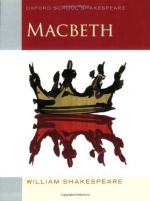|
This section contains 812 words (approx. 3 pages at 300 words per page) |

|
Macbeth's Soliloquy, Act 1 Scene 7
Summary: Macbeth's soliloquy in Act I, Scene 7 of Shakespeare's "Macbeth" is vital to our understanding of both the play and its central character through its powerful expression of the idea of conflict. The soliloquy aids in developing the play as a tragedy, focusing on the potential of the individual for good or evil and the error of judgement that leads the hero to disaste. It also shows Macbeth's inner conflict, as he is torn between his ambition and his moral conscience.
This soliloquy is delivered by Macbeth following Lady Macbeth's demonic suggestion to murder King Duncan. It outlines Macbeth's moral conflict where on the one hand his ambition spurs him to strive for power and on the other his conscious resists the urge. It is clear from the previous scenes that Macbeth portrays many of the traditional attributes of a tragic hero; courage, intelligence, moral awareness, potential, social status and a good reputation. He also possesses many characteristics of a villain namely his harmatia which is his ambition.
Macbeth's twofold personality reveals his inner conflict between appearances and reality. The soliloquy begins with Macbeth telling himself he's only concerned with the practical question of whether or not he can get away with the murder. The inadequacy of this tough attitude is exposed through the imagery he uses of life as "a bank and shoal of time" which will eventually...
|
This section contains 812 words (approx. 3 pages at 300 words per page) |

|


